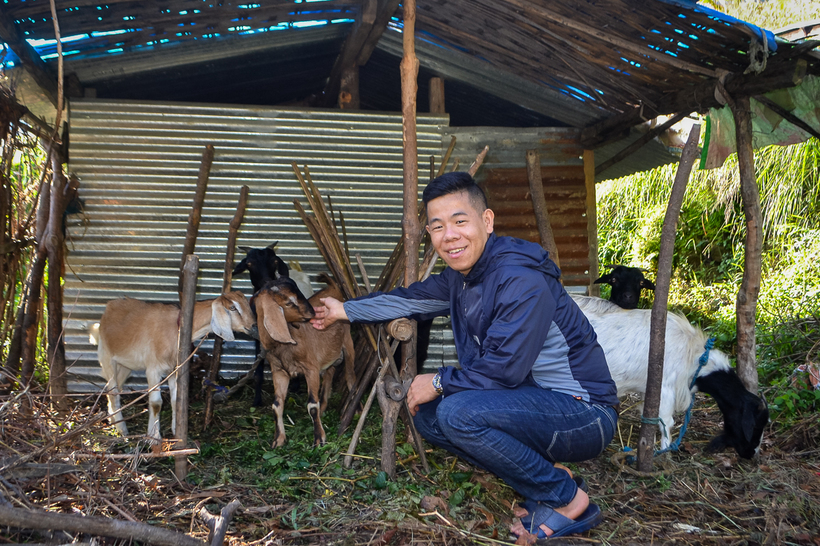
Picture: Yangmali Sahadev Rai, the Founder and President of Yang-Ward Foundation, an organisation that empowers single women in Nepal by engaging them in revenue-generating activities such as cash crop production, goat farming, and poultry farming to gain financial independence. He is also the partner of SAGrader, a software that provides instant content-specific feedback for students’ learning.
It has been over a year since the 7.8 magnitude earthquake struck the country of Nepal in April 2015. The Gorkha earthquake caused unprecedented devastation to the Himalayan nation, flattening villages and causing immense economic loss. Nepal’s path to recovery since then has also been fraught with obstacles, such as a fuel shortage and continuing political instability.
A few months after the earthquake struck the nation, I had the opportunity to visit and engage local artisans in a project to bring the artisans and their crafts’ online. I have since returned again this year to continue my social enterprise’s partnerships with local artisans.
During my visit, I got to meet outstanding change-makers contributing to a growing Nepali ecosystem of social innovators, comprising stakeholders from international to local NGOs, and from start-ups to conferences.
In this article, I highlight seven social innovators accelerating change in Nepal, through their diverse efforts, ranging from humanitarian aid to rural village development.
Yangmali Sahadev Rai
1. “When I was a student at the National School of Nepal, I began a project where we started a small school library in Bhojpur, on the eastern side of Nepal. During my time in Bhojpur, I saw that single women were treated very different by society and their family. They were accused of witchcraft. Their property was confiscated when their husband died or even ran away with other women. But no one was helping these single women. And I thought, ‘If I don’t help them, who will?’
I was inspired by these women. Despite enduring sufferings for such a long time, they were willing to work to improve their lives and contribute to society. We launched our pilot program shortly after. It grew and expanded, becoming self-sustainable in a year. We had donated over five thousand books to local schools for thousands of students, and scholarships for underprivileged girls. From then on, Yang-Ward Foundation implemented goat farming projects and poultry farming projects across different parts Nepal, with initiatives that create income for beneficiaries and also boost the local economy. The single women working with us are now making over five times their previous salary, and are working five days a week instead of every single day.
Nothing I can share about these projects compare to the experience of speaking to one of the single mothers of our projects. She shared that in the past, people in the village, even her in-laws, started dehumanising her after her husband passed away. Nobody would even lend her money when her months-old baby needed treatment at the local hospital. But being part of the projects have now steadily improved the her life, and the life of her child. From being unable to afford a single dollar, she is making over two hundred dollars now through our goat-farming project.
She doesn’t have to worry about buying new clothes for her child, or affording more food during the seasons. Stories like hers inspire me every day to work harder and reach out to other marginalised women who needs our help.â€
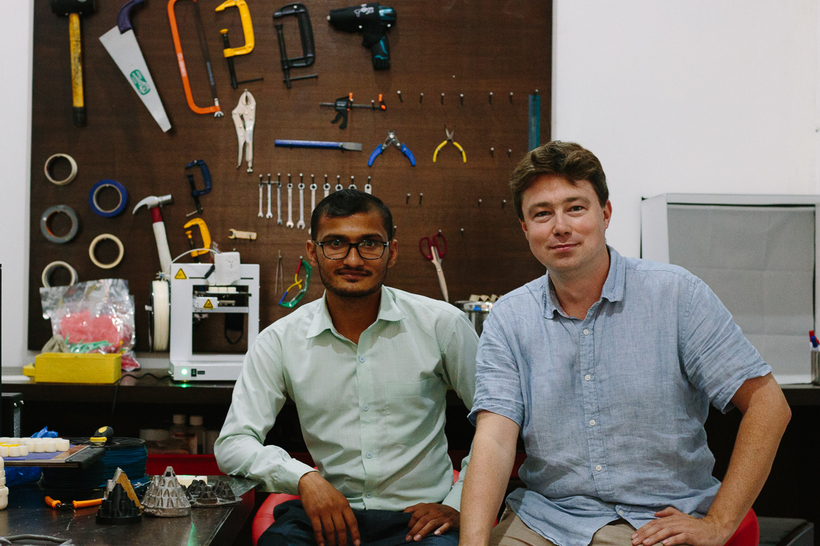
Ram and Andrew Lamb
3.
Andrew: “There was this ward in a rural clinic which did not have any power because a tiny little clip on the power connector of their power distribution board had broken. Because of this there was no electricity in the clinic and people weren’t being cared for properly. The alternative was to buy a new distribution board from Italy, which would have cost over a thousand dollars, and would take at least six weeks to reach this rural clinic. But what Ram and our colleague did was to simply print a new power connector. All it took was seven hours, and it cost less than a dollar. When we returned months later, the clinic was still using this same part. With the 3D-printers, we have now designed new spare parts for other hospitals, incubators and to maintain other medical supplies.
I think it is important that as innovators we design things that are genuinely useful. Field Ready’s purpose is humanitarian in nature, in helping respond to the earthquake. But with these printers it is also easy to see how we can also help local entrepreneurs with their businesses and the development of the country. Because quite frankly, with the printers, we can make anything.â€
Ram: “Previously, I’ve never got to see and use a 3D-printer. But I’m operating something that I have dreamed of for years. I used to only design things in software, but now I could see and make whatever I’m designing. Last week, I went to a hospital where there were over ten wheelchairs imported from overseas which were not operating because its wheels were broken. So they only had two wheelchairs for the whole hospital. But now we are designing wheels to fix their unused wheelchairs. I get really excited when I see problems like these that I can address. And like Andrew said, we also try to empower local manufacturers. There are many cases with local makers who have designs that they do not have the modern tools to cast a mould for.â€
Andrew: “Yes, recently we were approached by a local man who has not been to school, but has been working to improve burning efficiency of wood-burning stoves for fifteen years. After years of iteration, this individual, who is coming from a grassroots level, has developed a design that is so sophisticated that his design can no longer be prototyped by traditional tools by local craftsmen. He needed a new type of technology to cast a mould for his new burner. “
Ram: “But this man did not know about 3D-printing. He came here after hearing from a friend that maybe we could help him. After he shared his problem, I made a 3D model and printed the prototype.â€
Andrew: “Wood burning is never 100% clean, but we found that the burner that this man designed burned so cleanly, and it did not produce any smoke. A local innovator made a perfect iteration of a stove after fifteen years of local R&D. To me, this is classic grassroots innovation.â€
*Field Ready clinched a £400,000 grant from the Humanitarian Innovation Fund to scale as a cutting-edge innovation to bring about transformative change in the long-term.
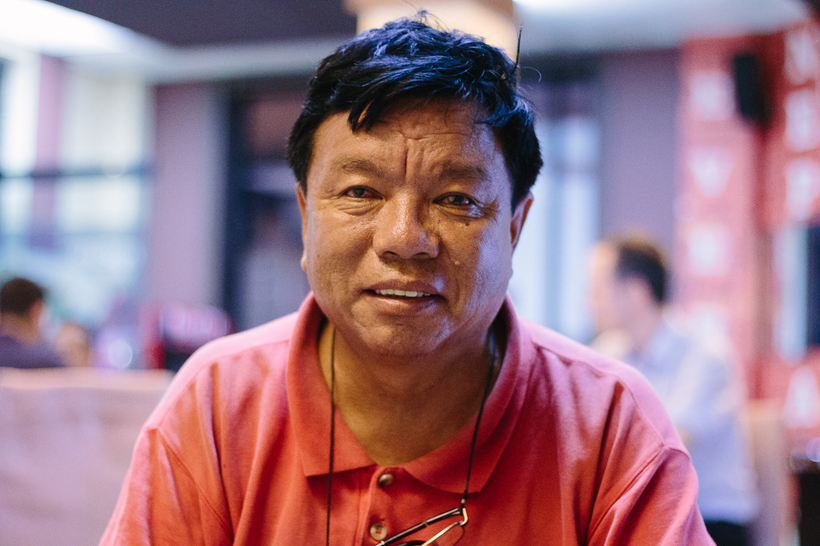
Mahabir Pun
4. “We have people in the remote villages who work very hard during the tourist seasons, and then come to the cities for a short holiday and spend their money here. The money that comes to the mountains does not stay in their villages.
Nepal also has a huge brain drain problem currently. Those that cannot find work leave the country. But that is not these people’s fault for leaving the country. It is the government who created that environment. We have not come up with ways to use the talented people of our country and capture their talents for the development of our science and technology. Nepal imports over 95% of its goods and exports very little. So in the same way, all the money that is coming in as remittances from people coming abroad and from tourists, is going out again to foreign countries.
I want to make Nepal a developed country, using both our human capital and development of science and technology to improve our economy. We can create local jobs for people to stay in the country, and we can create things to export. I shared my ideas with the government years ago. I have met four Prime Ministers, four Ministers of Finance, top leaders of political parties and other influential political leaders. All of them agreed that technology and science is important to develop Nepal and said they would help. But none of them have done anything so far.
The government has wasted four years of my life. And so now I am advocating for the people to invest in technology themselves. We are raising five million dollars in one year to build a hydropower station that will generate the funds to make the National Innovation Center self-sustainable, and so will be able to provide mentorship for new technologies, connect Nepali scientists and researchers, and investments for new products development in Nepal. Instead of Nepali leaving to find jobs, why can’t we have other people come to Nepal to find jobs? If other countries can do it, why can’t we?
My goal is to create freedom of opportunity for Nepal. â€
*National Innovation Center Nepal is fundraising for their 10MW hydropower station for the sole purpose for contributing to the social and economic development of Nepal.
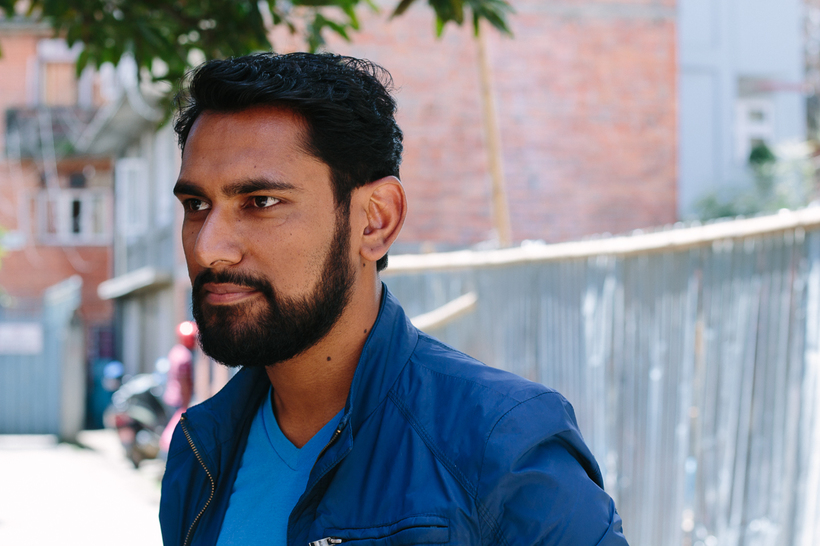
Prakash Neupane
5. “Do you know that Nepal has thirty million people, and one million Nepalis left last year to the Gulf countries to find work last year? Remittances from Nepalis who work in other countries is more than one-third of our GDP.
But it is not a bad thing for people to leave Nepal, because there are little job opportunities here and they also gain valuable experience and knowledge when they work overseas.
I believe that technology and tourism can come together to improve the lives of our people. Tourism can be a big thing in helping people stay in the country and earn an income locally, so they do not have to leave their family to work overseas. For me, it has been an uphill battle to convince different stakeholders from airlines to airports, to improve the tourism industry for the last two years. Growing tourism has also been a huge obstacle for Nepal because of how the international community perceives our local situation. The international media loves to showcase terrible stories about the earthquake that make headlines, even though Nepal is still very much a beautiful country after the earthquake.
We have to learn to promote our culture, nature and the unique aspects of Nepal to the global community. I believe in what we have in Nepal, and that I can help improve my country through entrepreneurship.â€
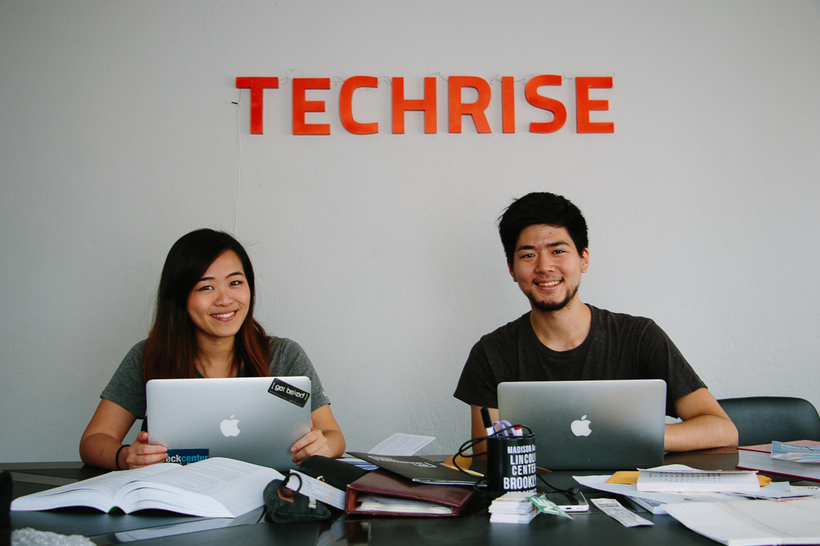
Robyn Natsuko Shinozaki and Takehiro Mouri
6.
Robyn: “After experiencing the earthquake in Nepal, I grew even more attached to the people here, and I was determined to contribute in any way I could. But I could only stay on for a few months to help with the rebuilding activities. The idea to help Nepal through coding bootcamps only came to us one year later. One of the things we realised were that many talented young people were leaving the Himalayan country to Japan and Middle East countries like the UAE. That is because there is a lack of job opportunities here. Many do not have a choice because there is no way they can sustain their families if they don’t leave the country. I think that if Nepal wants to evolve economically, politically, and socially, there definitely needs to be more job opportunities for the youth here.â€
Takehiro: “I knew it is possible to go from zero to programmer because that is what happened for me. I was a business and economics student who ended up learning programming from a bootcamp remotely. But coding bootcamps, even those that are remote, are just too expensive for those who do not live in affluent countries. Computer science degrees can be valuable, but may also not teach the practical skills needed.
So we decided to target people in Nepal, and providing a low-cost, high-quality coding curriculum to give opportunity to more young people. We’ve really seen the progress in our students. And it’s amazing to see that they can believe in themselves. I was happy to hear one student share that learning with TECHRISE has been one of the most productive months in his life.â€
Robyn: “Our dream is to let our students better imagine their future in the country, and giving them more control over their futures. Ultimately, the locals know Nepal as a country and as a market the best. As long as they have the passion and the grit to stick to it, we hope that by providing them with the skills to develop new solutions, they will be better able to solve local issues through local innovations.â€
*TECHRISE intends to expand to the US with a pay-it–forward system, where portion of the tuition fees from the US would go toward funding a human-trafficking survivor in Nepal in learning how to code.

Kuldeep Aryal
7. “I’m not a city person. I think in terms of policy and infrastructure, the development of cities in Nepal has not been going well. The city has lost its soul along the way. You don’t know the person next door anymore, and there’s a sense of insecurity. It is unlike in the village where everyone knows and respects one another.
I came from a small village in the Western part of Nepal, but a lot of people wouldn’t listen to my views on village development since I am not an academic or an expert. So I organised TEDx conferences to gather agriculturalists, economists, social activists and tech entrepreneurs to come together and provide new ideas for the development of our villages in tandem with policies and cities.
Nepal is a country that does not lack problems to be solved. You will not be short of inspiration. There are so many things that you can do. What Nepal lacks is the resources to build solutions for these problems. I always see ‘hackathons’ in other countries that concentrate on building mobile apps, but they are often building apps for frivolous things like counting your calories. To me, those are not problems worth solving.
We ran a design thinking workshop recently for a village in Gorkha, which is two days away from the nearest roads and has no electricity. So how do you design solutions for people in these villages to make their lives better? That is the kind of problem I like to work on.â€
Ending Notes
These seven personas, through their diverse efforts, ranging from 3D printing humanitarian supplies to pay-it-forward programming initiatives gave me a glimpse of the nascent movement of social innovation and social enterprise rising in Nepal.
And what has always struck me in my visits to Nepal, more so than the flowing Himalayan landscapes, and the country’s cultural brilliance, is the resolve and spirit of the Nepali people that continues to shine ever so brightly.
As the nation’s artisans pick up their tools to rebuild their cities and villages, we know that Nepal will rise again.
By Jaron Soh






